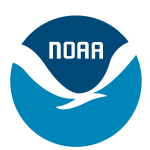- Industry: Government
- Number of terms: 30456
- Number of blossaries: 0
- Company Profile:
NOAA Coral Reef Conservation Program, National Oceanic and Atmospheric Administration, U.S. Department of Commerce
A sensory receptor which responds to potentially harmful stimuli; produces a sensation of pain.
Industry:Natural environment
A taxonomic group that is above an order and below a class or subclass.
Industry:Natural environment
Animals that inhabit the sandy or muddy surface layers of the ocean bottom, i.e., those that live buried or dig into the substrate.
Industry:Natural environment
Degeneration of a cell in which the nucleus shrinks in size and the chromatin condenses to a solid, structureless mass.
Industry:Natural environment
In fishes, one of several bones or cartilage with which the base of the rays of the median fins articulate .
Industry:Natural environment
Pycnogonids, or sea spiders, are benthic, marine arthropods, with a superficial resemblance to true spiders, to which they are probably only distantly related. They are carnivores and use a muscular pharynx to suck soft food into the gut. The mouth is at the end of a large proboscis. Digestion is intracellular and most feed on sponges, cnidarians, or bryozoans from which they suck fluids. There are no excretory organs, respiratory organs, or body cavity (coelom).
Industry:Natural environment
The area below the consolidated slope extending up to 1 km but no deeper than 50 m. A synonym of talus slope.
Industry:Natural environment
The irridescent innermost layer of a molluscan shell that is secreted by the mantle. It is also called the mother-of-pearl layer.
Industry:Natural environment
